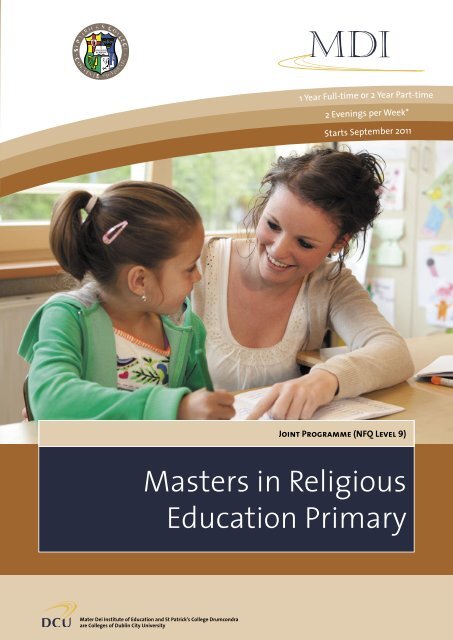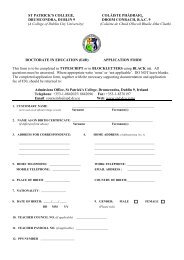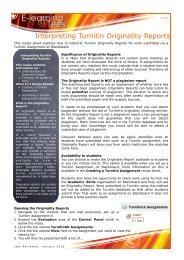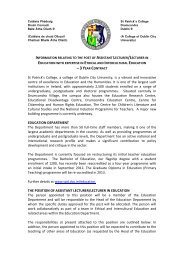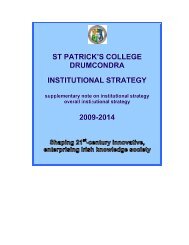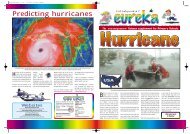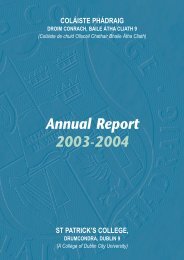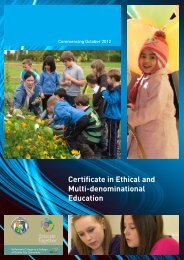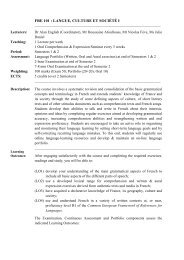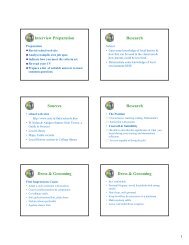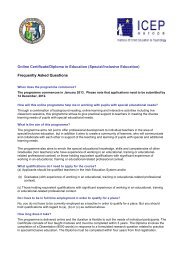MREd - St. Patrick's College - DCU
MREd - St. Patrick's College - DCU
MREd - St. Patrick's College - DCU
You also want an ePaper? Increase the reach of your titles
YUMPU automatically turns print PDFs into web optimized ePapers that Google loves.
1 Year Full-time or 2 Year Part-time<br />
2 Evenings per Week*<br />
<strong>St</strong>arts September 2011<br />
Joint Programme (NFQ Level 9)<br />
Masters in Religious<br />
Education Primary<br />
Mater Dei Institute of Education and <strong>St</strong> Patrick’s <strong>College</strong> Drumcondra<br />
are <strong>College</strong>s of Dublin City University
Joint Masters in Religious Education Primary<br />
The Masters in Religious Education (<strong>MREd</strong>) is jointly hosted by<br />
the Mater Dei Institute of Education and <strong>St</strong> Patrick’s <strong>College</strong>,<br />
Drumcondra, both colleges of Dublin City University, the<br />
awarding body.<br />
The Programme focuses on Religious Education and<br />
Catechetics in respect of the child of primary school age.<br />
This is reflected in the rich range of modules on offer that<br />
covers such areas as education, religious education, theology,<br />
sacraments, scripture, ecclesiology and world religions.<br />
Graduates will demonstrate the ability to take on significant<br />
responsibility in the area of religious education at the primary<br />
level.<br />
Upon successful completion of this programme the graduate<br />
will be able to demonstrate:<br />
• A systematic and comprehensive understanding of the<br />
theology and pedagogic theory involved in the religious<br />
education of primary school children<br />
• An enhanced critical sensitivity to the psychological,<br />
sociological, religious and political issues raised by the<br />
teaching of religion at primary level.<br />
• A command of tools of research, including writing skills, in<br />
the areas of theology and pedagogic inquiry, especially as<br />
these bear on the teaching of religion at primary level<br />
• The particular skills necessary to address the issues that<br />
arise in the creation, management and implementation of<br />
programmes of religious education in the primary sector<br />
Graduate Voice<br />
“The <strong>MREd</strong> was a wonderful opportunity for me to build on what<br />
I already knew about primary religious education and to improve<br />
how I teach it in my own classroom. I would wholeheartedly<br />
recommend the programme.”<br />
Elaine Mahon,Graduate, 2005<br />
Who is this Masters for?<br />
In the main, <strong>MREd</strong> students are primary teachers who wish to:<br />
• Enhance the way they teach religious education to primary<br />
school children<br />
• Enrich themselves intellectually and spiritually<br />
• Improve their own understanding of the relationship between<br />
Religious Education and Catechetics<br />
The programme is commensurate with teachers who wish to<br />
develop their own Continuing Professional Development (CPD).
The <strong>St</strong>udent Experience<br />
“Although I work full time as a primary teacher, I found the programme challenging and rewarding with plenty of opportunity to<br />
take new ideas and methodologies straight into the classroom. The lecturers both in MDI and <strong>St</strong> Pat’s were experts in their areas.<br />
The coursework was carefully planned, very interactive and in keeping with the school year. I feel that I have gained from the course<br />
not only professionally but also personally”.<br />
Louise Traynor, Graduate, 2010<br />
Flexible Scheduling<br />
The programme is offered:<br />
- Full-time (one year)<br />
- Part-time (two years)<br />
Typically, the programme is taught two evenings per week to<br />
facilitate teachers. *<strong>St</strong>udents will also attend two Saturdays<br />
during the academic year to assist practical research skills.<br />
Modules<br />
All course participants will take the following core modules:<br />
- Contemporary Methodologies in Primary Religious Education<br />
- Spirituality, Prayer and the Educator<br />
Participants will also take six modules that may<br />
include some of the following:<br />
Modules vary from year to year and students will be notified of<br />
the choices available well in advance of registration. In addition,<br />
participants will complete a Research Module which includes a<br />
minor thesis.<br />
Career Prospects<br />
Many who have received this qualification have continued<br />
teaching but a significant number of graduates now occupies<br />
positions as primary school religious education diocesan<br />
advisors, college lecturers and DES inspectors. Others have<br />
secured positions as principals and post-holders in schools.<br />
In addition, graduates of the programme have contributed to<br />
publications in the area of primary religious education, given<br />
lectures to various parish groups and they have organised and<br />
delivered religious education courses for teachers.<br />
Christology in Dialogue with<br />
Culture Today<br />
Faith and Culture in Ireland<br />
Contemporary Issues in<br />
Ecclesiology<br />
Resourcing Religious Education<br />
in a Digital Age<br />
Modules<br />
Contemporary Issues in<br />
Ecumenism and Inter-Religious<br />
Dialogue<br />
Virtual Learning Environments<br />
and Religious Education<br />
Creative Writing for Children<br />
Psychology of Religious and<br />
Moral Change<br />
The Church in the City: Early<br />
Christian Communities<br />
The Cultures of the School<br />
and Religious Dimension of<br />
Education<br />
Denial of Death and the Eclipse<br />
of Hope<br />
Principles of Faith<br />
Development<br />
(Post-Primary Module)<br />
Awards Available<br />
Cost<br />
The Masters in Religious Education Primary is awarded by<br />
Dublin City University (Level 9 of the National Framework of<br />
Qualifications).<br />
Participants who do not wish to complete an entire Masters<br />
may exit the programme with a Graduate Diploma (after<br />
successfully completing 60 credits of taught modules) or with<br />
a Graduate Certificate (after successfully completing 30 credits<br />
of taught modules). It is also possible to audit individual<br />
modules without obtaining an award.<br />
Entry Requirements<br />
Applicants will normally hold a good honours bachelor degree.<br />
Applicants must also hold a relevant professional qualification<br />
(e.g. B.Ed, Grad Dip in Ed., BD). An appropriate combination<br />
of non-degree qualifications and relevant professional<br />
experience may be accepted by the Programme Board as<br />
equivalent. The application process for admission may include<br />
an interview. References must also be provided, if requested.<br />
For 2011 entry fees please visit www.materdei.ie<br />
or www.spd.dcu.ie<br />
How do I apply?<br />
Application forms are available at www.materdei.ie<br />
or www.spd.dcu.ie<br />
Alternatively, applications forms are available by<br />
contacting:<br />
Admissions Office<br />
<strong>St</strong>. Patrick’s <strong>College</strong><br />
Drumcondra<br />
Dublin 9<br />
Telephone: (01) 884 2096 Email: admissions.office@spd.dcu.ie<br />
Apply early to secure a place on the programme.<br />
The closing date for applications is 10th June 2011.
www.materdei.ie<br />
www.spd.dcu.ie<br />
MDI<br />
Mater Dei Institute of Education (MDI) is a <strong>College</strong><br />
of Dublin City University. MDI specializes in teacher<br />
education, theology, religious studies, Irish studies,<br />
humanities, philosophy and ethics. MDI seeks to<br />
develop in graduates a capacity for creative thought,<br />
critical openness and rigorous intellectual inquiry.<br />
SPD<br />
<strong>St</strong>. Patrick’s <strong>College</strong> Drumcondra (SPD) is a <strong>College</strong><br />
of Dublin City University. The <strong>College</strong>’s academic<br />
departments are currently divided into two faculties<br />
- the Faculty of Humanities and the Faculty of<br />
Education. There are over 2,000 students taking<br />
courses at both undergraduate and postgraduate<br />
levels.<br />
Want to find out more?<br />
If you want to find out more about the<br />
programme please contact:<br />
Margaret Brierty<br />
Admissions Office (SPD)<br />
Telephone (01) 884 2096<br />
Email: admissions@spd.dcu.ie<br />
Academic Enquiries to:<br />
Dr Caroline Renehan<br />
Programme Co-chair (SPD)<br />
Telephone: (01) 884 2084<br />
Email: caroline.renehan@spd.dcu.ie<br />
Dr Kevin Williams<br />
Programme Co-chair (MDI)<br />
Telephone: (01) 808 6523<br />
Email: kevin.williams@materdei.dcu.ie


